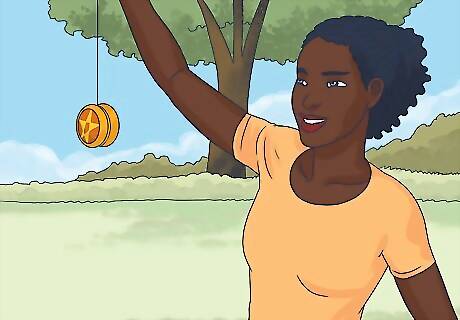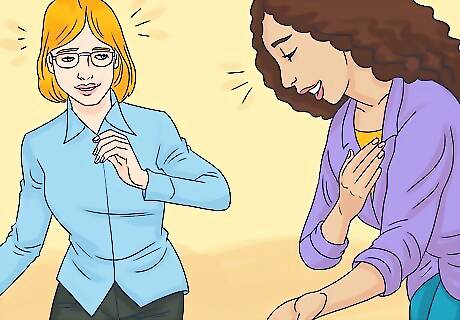
views
- Take the pressure off and don’t judge yourself for not meeting whatever imagined standard of humor you have. You’re perfect the way you are.
- Immerse yourself in comedy by watching funny movies and hanging out with funny people to naturally cultivate your sense of humor. Make sure to allow yourself to laugh in these situations.
- Memorize a few jokes if you want a quick way to make people laugh in social situations.
- Remember, your sense of humor is not the sum of who you are. Everybody is unique and you’ve got nothing to be ashamed of.
- Read and study about how to adjust your attitude and release negative, bitter thoughts to learn to laugh again.
Take a relaxed approach to humor.

Finding humor in things is difficult if you’re treating this as a job. Get in the mindset that you’re setting out on a fun, new adventure, not trying to fix something. After all, there is nothing wrong with you that needs fixing! If you make this a huge deal or you judge yourself every time things don’t work out, you’re going to make it harder to laugh at things. One of two things is going to happen here. Either you relax on your mission to become funnier and it works, or your relax, it doesn’t work out, and you have an easier time accepting it. It’s a win-win! Humor is innate in the sense that everybody is born with the ability to find things funny. At the same time, humor can also be learned. Even if you don’t have a sense of humor now, you can 100% acquire one.
Recognize and respect the humor you do have.

You likely have a sense of humor, it just might not be what you imagine! There are so many different types of humor out there. It’s possible that you do have a sense of humor and it simply isn’t like everyone else’s. Types of humor include: Wit – The ability to form clever or intelligent connections (“They’re the kind of person who has never used a word that might cause you to pick up a dictionary.”) Dry humor – Humor based on extremely emotionless statements and ideas (“I don’t know if you know what that word ‘complicated’ means, but it’s very simple.”) Sarcasm – Mockery that relies on exaggeration and irony (“They have a great vocabulary. Well, they may not know that word.”) Physical humor – Comedy based on physical action, and often called slapstick (“You ever read one of these?” holds up dictionary) Dark humor – Comedy that treats taboo or serious subjects with levity (“They have the vocabulary of my grief counselor. And my grief counselor is dead.”) Self-deprecating humor – Humor based on making fun of yourself (“I have no vocabulary, so I read the thesaurus. Now I’m smart, clever, intelligent, and academic.” Puns – Humor based on turns of phrase have two meanings (“You should thank me for adding ‘plethora’ to your vocabulary. I’m sure it means a lot.”) Surreal humor – Random, quirky, or nonsensical comedy (“You won’t find the word frumplous in the dictionary. Know why? It doesn’t exist.”) Identifying what makes you laugh helps provide a roadmap to what your body naturally finds humorous.
Hang out with funny people.

The best way to develop humor is to immerse yourself in it. If you’ve got friends, family members, or acquaintances who are always laughing it up, spend more time with them. Not only will you foster your relationships by spending more time socializing, but you’re going to naturally cultivate a deeper appreciation for humor. This can take time, so try not to get frustrated if you feel like you aren’t picking up on things super quickly.
Watch more comedy.

If you never watch comedic films or TV shows, start now. The people who craft comedic material for a living are masters of their craft. If you feel like you just don’t “get” humor but you don’t consume a lot of it, get into the habit. It’s possible that you just haven’t found the right brand of humor for you, but you may if you explore some new material. Watch popular comedic films and TV shows. If you’ve never watched standup comedy, give it a shot! Scan the trending tab on Youtube and look at what comedic videos people are watching. Some people simply prefer more literary comedy. Try reading the Sunday comics or browsing webcomics. It really helps to look up all the different styles of comedy out there. Understanding what exists and why it exists can help open up the reasoning behind why it's funny (or why it isn't). Tal Ben-Shahar Tal Ben-Shahar, Psychologist A sense of humor is not something we either have or lack. Rather, it exists on a spectrum, and we can cultivate it by exposing ourselves to humor and comedy in small doses on a regular basis. Start by setting aside ten minutes a day to read comics, watch stand-up comedy clips, or engage with humorous memes. Over time, you'll likely notice your capacity for humor expanding.
Explore new cultures.

Different communities have their own distinct forms of humor. If you feel like the “mainstream” forms of comedy aren’t for you, try immersing yourself in a different community. You might watch comedies made by people from other countries, or hang out with the foreign exchange students at your school to discover what they find humorous. Just surrounding yourself with people from different backgrounds can help dramatically. You’ll improve your sense of humor over time.
Embrace your inner child.

Stop taking yourself super seriously and just enjoy playing. Whether it’s playing video games, skipping down the street, or frolicking in a rainstorm, tap into your best impression of a 6-year-old. Remember what it was like to find the world engaging, new, and strange. It’s a lot easier to find humor in things if you allow yourself to play like you did you when you were little. Revisit your favorite childhood games and interests. Play with modeling clay, mess around with a yo-yo, or break out your old board games and grab some friends. Embracing silliness and getting back in touch with your inner child can make it easier to loosen up and find the humor in things. Adults are socially conditioned to not be silly, goofy, or funny. If you can let go of those expectations for yourself, you can tap into your inner-funny and discover what your sense of humor truly is.
Get in the habit of laughing every day.

Even if you don’t find something funny, force yourself to laugh. Some people naturally struggle with letting go and actually laughing because they’re self-conscious. Forcing yourself to laugh—even if you’re alone or don’t find anything funny—can be a great way of “exercising” your laughing muscles. Eventually, laughing will be as natural as breathing for you! Laughter is medicine to the soul, and laughing often triggers more laughing. Try letting yourself laugh out loud at slightly funny things and you may discover the real humor!
Take cues from people around you.

When other people laugh, try to get into the spirit of things. When other people start smiling and getting ready to laugh, lean into it and try to find the joy and humor in whatever triggered the moment. Try laughing along, even if it wasn’t that funny. You may just find yourself learning to open up and find the funny in things. If you don’t get what was so funny, ask! There is absolutely nothing wrong with saying, “I don’t get it.”
Remember a few simple jokes.

Memorize a few canned jokes so you can be funny when necessary. If you feel like your sense of humor has a negative impact on your social interactions, just find a few really good, simple jokes and commit them to memory. They don’t have to be original. Then, whenever you’re in a situation that calls for a joke, you can deliver your lines with ease! You could try: “I was going to wear my frog sandals today, but I was told this event had a policy against anything open-toad.” “What do you call a fish with no eyes? A fsh.” “You know what kids these days play when their mom won’t let them use the phone? Bored games.” “There are two types of people out there. Those who can extrapolate from incomplete data, and…”
Practice.

Your humor is like a muscle that needs to be exercised. Take risks in social situations and try to make people laugh. If it doesn’t work out, who cares? If you aren’t ready to test things out in public, try cracking jokes with your parents, roommates, or siblings. See what works and what doesn’t. You’ll eventually find the right vibe for you. Don’t give up. As frustrating as this may be, everybody has the ability to make progress and find their personal brand of humor. If your partner doesn’t understand your sense of humor, try different kinds of jokes and wisecracks out until you find something they laugh at. Then, lean into more jokes in that style.
Let go and learn to laugh at yourself.

Try not to take yourself so seriously to find the humor in things. Being able to laugh at yourself and see the funnier side of things can be difficult if you treat everything you do super seriously. Try practicing laughing at yourself when you are alone. Just as you might laugh at someone if they make a silly mistake or trip, try laughing at yourself when those occur. For example, if you trip in front of someone and they laugh, don’t get embarrassed. Instead, hop back up and bow like you’ve just performed a beautiful dismount.
Accept who you are.

Learn to love and own who you are regardless of your humor. So what if you aren’t the funniest person in the world? You are not defined by your ability to laugh, make people laugh, or understand why people laugh. Regardless of however you feel about your sense of humor, it shouldn’t determine how you feel about yourself. Remember, you are valid and you are no less interesting or valuable just because you don’t think you have a sense of humor.
Try to find the comedy in your partner’s sense of humor.

If you and your partner aren’t on the same comedic wavelength, don’t fight it. Laugh at how silly it is when your partner laughs at something you find totally mundane, and don’t take it personally if they think you’re goofy for laughing at something they find unfunny. By appreciating one another and learning to laugh at yourselves, the different senses of humor won’t seem all that different. Rest assured that matching senses of humor actually aren't essential for a healthy, happy relationship.


















Comments
0 comment